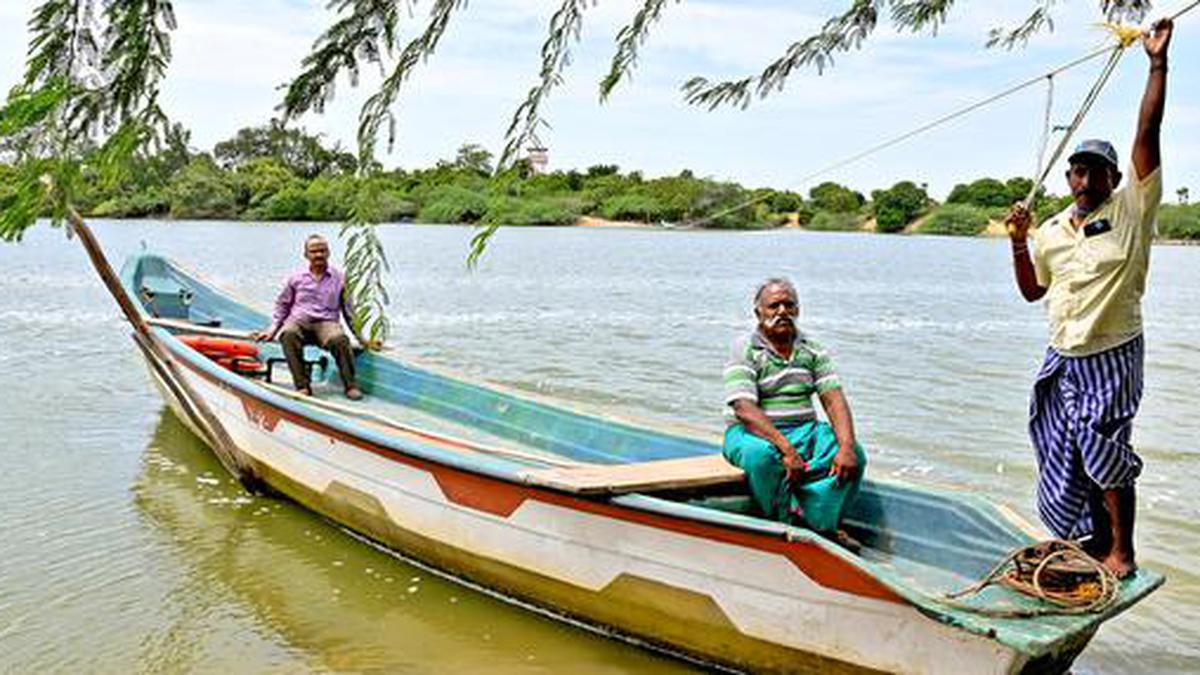
Caught between the stars and the sea Premium
The Hindu
Residents of seven villages in Tirupati district, abutting India's famous rocket launch station, are denied basic amenities due to the presence of the station and the bird sanctuary. Despite pleas to ISRO, politicians, and the NHRC, the villagers remain outcasts in their homeland, struggling with mobility, employment, and access to healthcare and education.
Carrying a big bag on his shoulders and armed with a battery-operated torch, K. Sadasivam, 63, boards a State-run bus on the less travelled route between Sullurpeta and Rayadoruvu in Tirupati district of Andhra Pradesh. The bus winds its way through a desolate 40-minute stretch to reach the Pulicat Lake Bird Sanctuary even as the towering 3-metre-high compound wall of Satish Dhawan Space Centre at Sriharikota (SDSC-SHAR) appears on one side. Barbed wire fencing stands sentinel to prevent unauthorised entry into the area, casting an eerie atmosphere along the 14-km stretch. This closely guarded road, primarily used by SHAR’s surveillance vehicles, rarely sees another soul.
Upon reaching Rayadoruvu, also known as Pudirayadoruvu, Sadasivam gets off the bus and presents his identity card, an indispensable document for the residents of villages abutting India’s famous rocket launch station. The security personnel scrutinise it and grant him passage through a rickety gate. His journey continues as he boards a boat to traverse a 200-metre-wide creek, the only route leading to home.
This is not an isolated experience but a recurring ordeal for nearly 20,000 residents of seven villages in Vakadu mandal surrounded by the Pulicat Lake Bird Sanctuary, ISRO’s space centre, the Buckingham canal, and the Bay of Bengal and its backwaters on all four sides, every time they step in or out.
D. Madhusudhan Reddy, former president of Mandal Praja Parishad in Vakadu, recounts the time when their families led a life of quiet comfort on Sriharikota island. However, that existence was disrupted when they were relocated. “The 32 villages on the island lived life king size, but when we were rehabilitated to Nemilimitta Agraharam, Talamanchi and other places, our ancestors could not survive the change and lost their livelihood sources. Once landlords, they were reduced to the ignominy of daily wage earners,” recalls Reddy, who is now serving as the general secretary for the ruling YSR Congress Party in Tirupati district.
Even as India celebrates its space achievements, such as the recent Chandrayaan-3 and Aditya L-1 missions, the plight of these ‘unsung heroes’ whose ancestors sacrificed their land for the establishment of the space station often goes unnoticed. After being relocated to the neighbouring villages in the 1970s in phases, the residents are now outcasts in what was once their homeland.
Given the high-security national establishment on one side and an ecologically sensitive sanctuary on the other, the problem faced by people in the Gudur and Sullurpeta constituencies of Tirupati district is two-fold. In Gudur, 28 hamlets in Raviguntapalem, Nidugurthi, Moolapadava, and Pudirayadoruvu panchayats (in Vakadu mandal) and 18 in BGK Palem and Ellur panchayats (in Chittamur mandal) bear the brunt of several restrictions. In Sullurpeta constituency, Doravari Satram and Sullurpeta mandals also face challenges, albeit to a lesser extent.
Ramsubba Reddy, another resident of Pudirayadoruvu, who is expecting 100 guests for a family wedding, has to apply for 100 passes at the SHAR security office. Once the passes are ready, guests will need to present their identity cards at security checkpoints to enter the village. Even one extra person will be turned away without mercy. This is precisely why Tavva Ravi, an electrician and plumber based in Sullurpeta, declines service requests from the cluster of seven villages, as a simple repair job can take an entire day.











